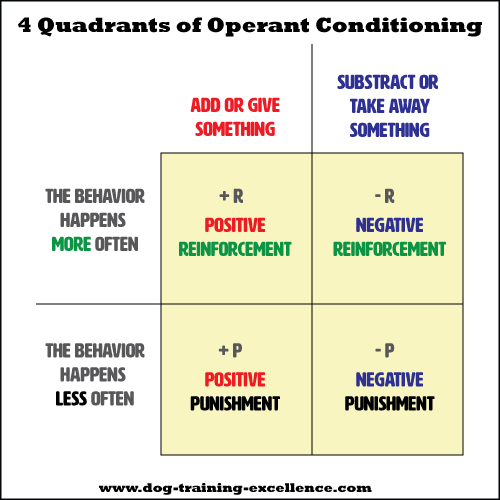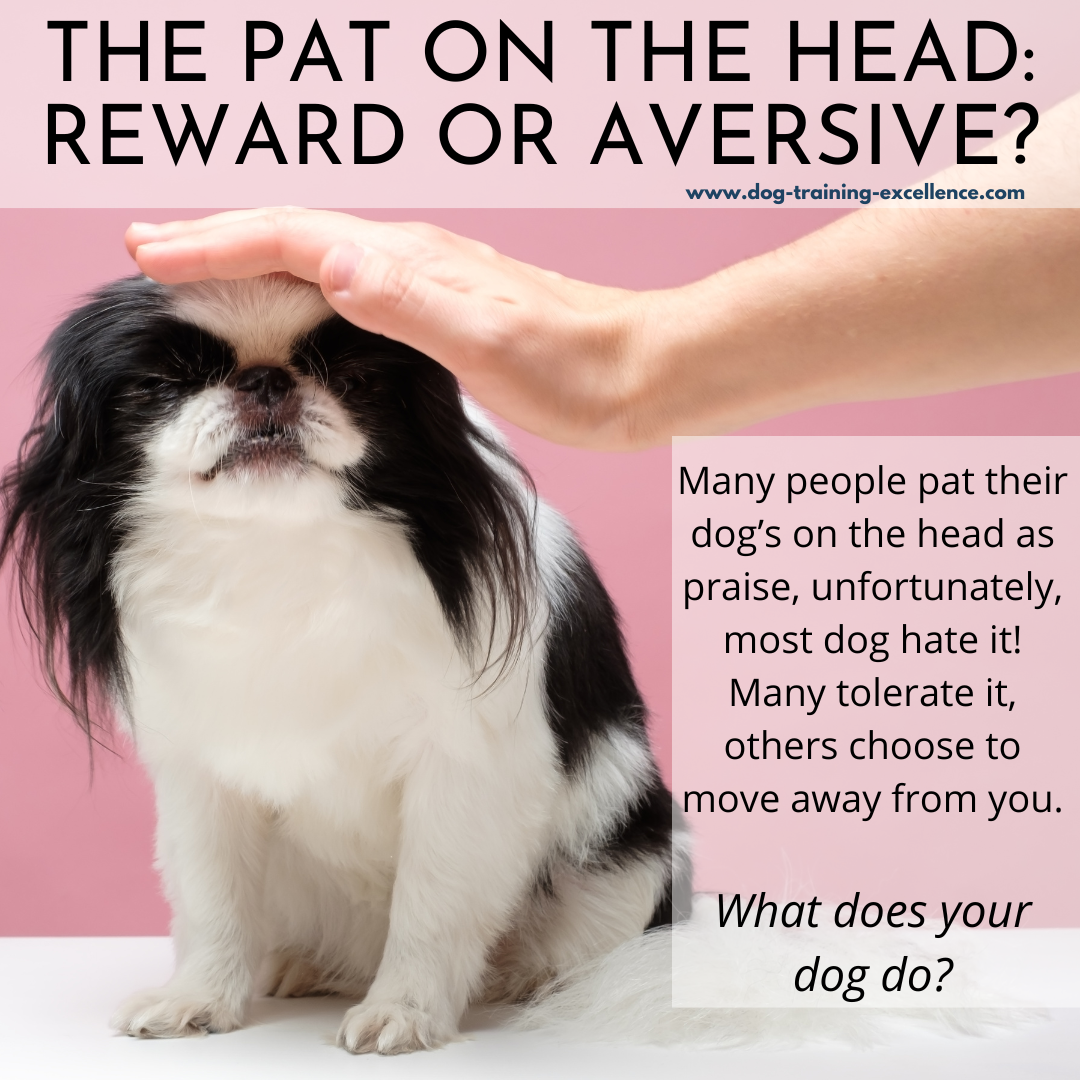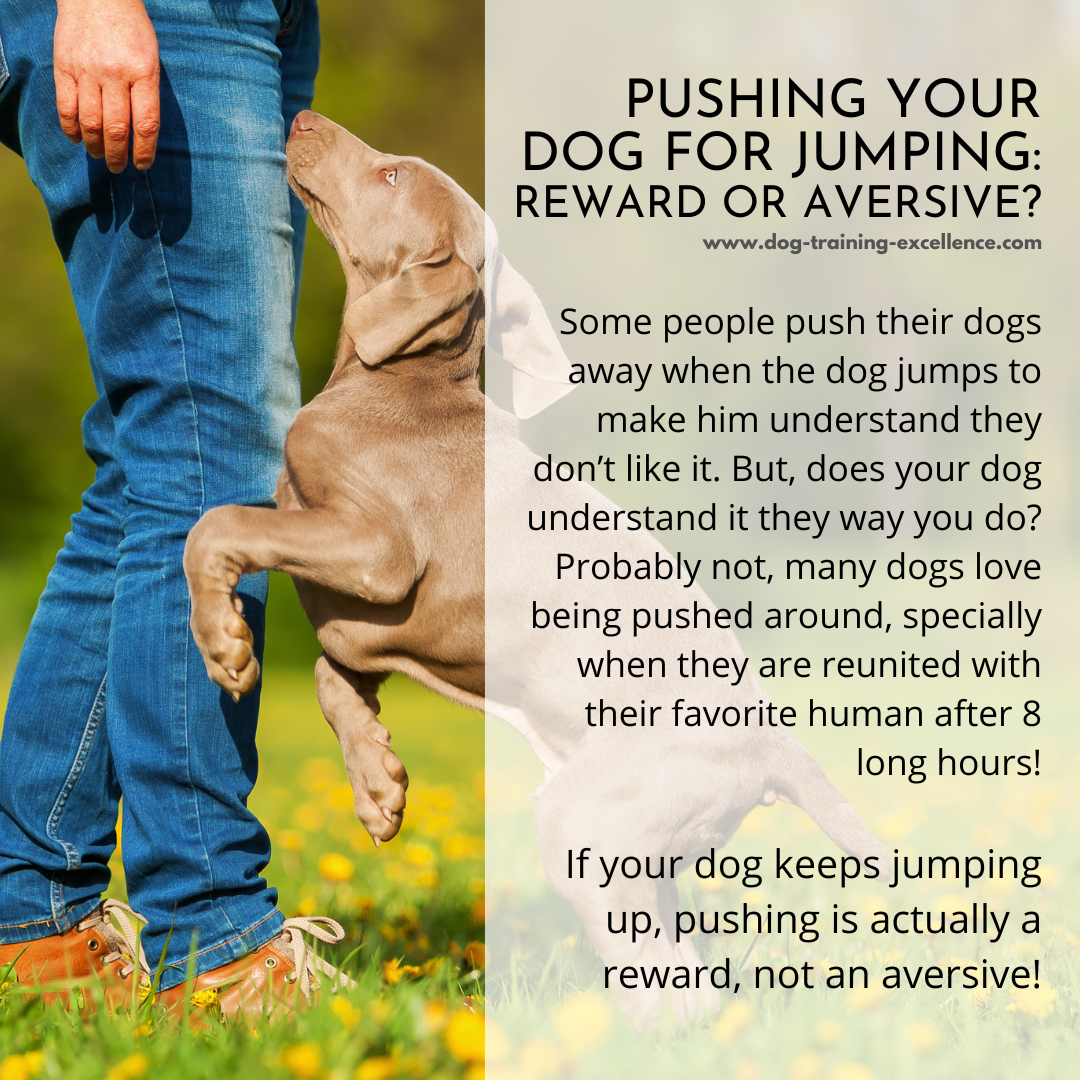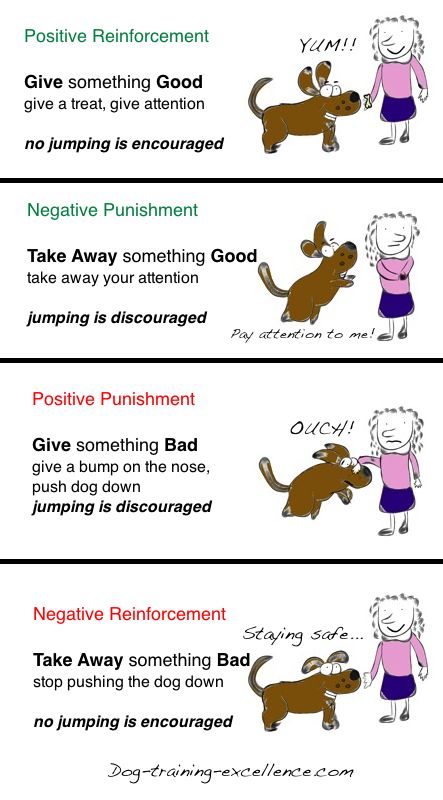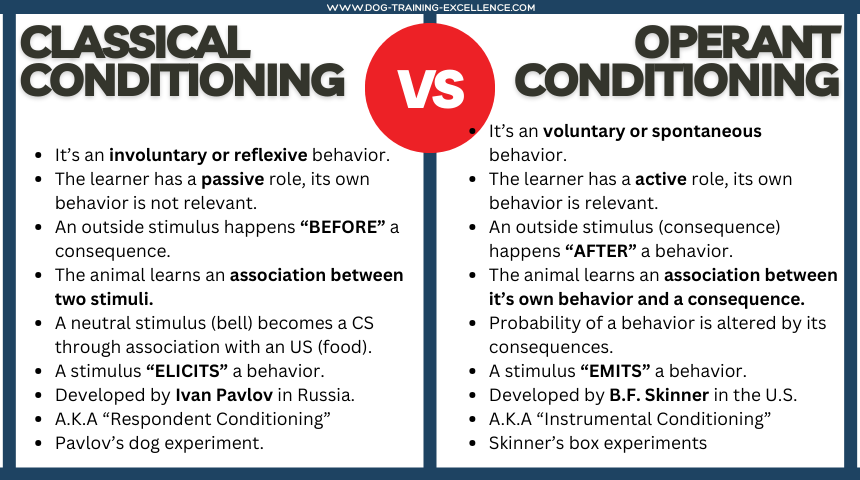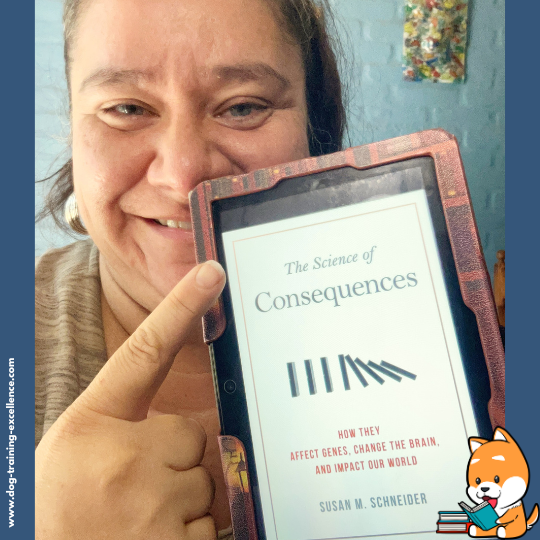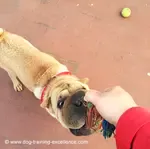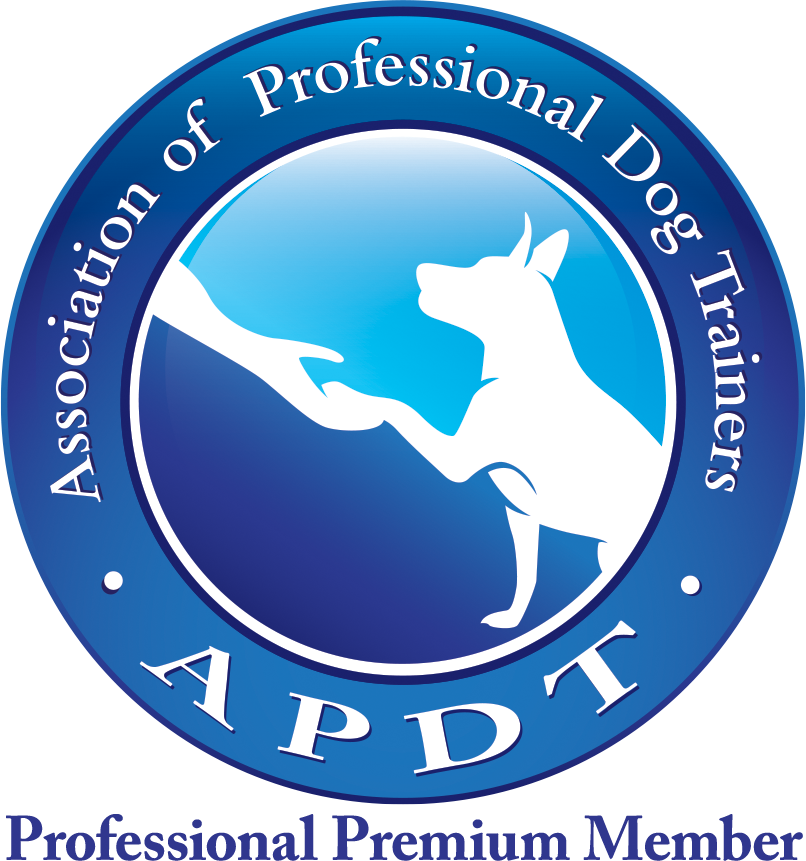I try to write my posts as unbiased as possible and recommend the products I consider to be useful and the best. I use affiliate links, this means that–at no extra cost to you–I can make a commission on a purchase you make after clicking on them. As an Amazon Associate I earn from qualifying purchases.
Operant Conditioning
In dog training and everyday life
Let’s say it again: Operant conditioning.
What does that mean? … It means learning (conditioning) that -what I do- (operant, as in operator) has a consequence.
You might have heard about positive vs. negative training methods, or using reinforcement or reward vs. punishment. All training methods, no matter how they're called, are based on the
psychology principles of classical and operant conditioning. Both punishment and
rewards are an integral part of this theory that explains some of the
most basic ways animals learn. All animals, including us, humans.
Let me tell you a little extra secret too: this concept will also become handy when dealing with unruly kids, a difficult mother-in-law, a messy husband/wife or a misbehaving cat! It is basic animal psychology and that is why it applies to all species.
Article Highlights:
- Principles of Operant Conditioning
- Why is Operant Conditioning Difficult? (With examples)
- How to Use The Four Quadrants of OC in Dog Training
- Operant Conditioning Dog Training Books
- More Operant Conditioning Everyday Examples
- How to use OC to Teach Dog Training Commands
- Operant vs. Classical Conditioning in Dog Training
- Advanced Books on Classical and Operant onditioning
- Frequently Asked Questions About OC
Principles of operant conditioning
Operant conditioning (a.k.a. Instrumental conditioning) is a theory in psychology that explains and predicts how animals learn. Understanding the principles of operant conditioning gives you a super power. Yes, you heard it right! A SUPER POWER. If you understand how it works, you can change animal's behavior, other people's behavior and even your own behavior.
Operant conditioning is how we learn to associate our own behavior with a consequence.
Positive vs. negative dog training techniques explained

Dog trainers and people in general, use the term “positive” to imply that they use rewards as the main dog training technique. They use “negative” to imply an obedience method based on corrections.
But, according to the psychology of behaviorism, positive and negative have very strict definitions. Regardless of the training methods used, in psychologial terms, we will be applying both “positive” and “negative” along our training journey with our dogs. Here is why...
There are 4 possibilities (a.k.a. quadrants)
1- Positive Reinforcement (+R)
2- Positive Punishment (+P)
3- Negative Reinforcement (-R)
4- Negative Punishment (-P)
Let's further break down the four possibilities of operant conditioning to fully understand what they mean.
Positive / NegativeThe words "positive" and "negative" do not mean "good" or "bad" in pshycology. Positive means to give (i.e.: give a treat, give a jerk on the leash). Negative means to take away (i.e: take away your attention, take away the pressure on a choke chain). |
Reinforcement / PunishmentThe words "reinforcement" and "punishment" do not mean "good" or "bad" by your standards. Reinforcement means that the behavior will happen more often. Punishment means that the behavior will happen less often. Reinforcement and punishment are defined by the outcome! You may think sending your teenage kid to his room is punishment, but he/she may think it's great (they finally get to be alone and do whatever they want!). |
The four possibilities of operant conditioning are often explained in what is known as "The 4 quadrants of operant conditioning". On of the things that immediately jumps out from the quadrants is that we have "positive punishment" (which sounds like an impossibility, doesn't it? How can punishment be positive?) and "negative reinforcement" (another one that sounds anti-intuitive).
This is because as explained above, positive means "to give" and negative means "to take away". So, I can produce punishment (a decrease in behavior) both by giving an electric shock (I give something bad, the behavior stops), and also by taking away TV time (I take away something good, the behavior decreases to win it back).
In the same manner, I can produce reinforcement (an increase in behavior) both by giving ice cream (I give something good, the behavior increases to get more), and also by taking away the bipping sound when the seat belt is not on (I take away something bad or annoying, the behavior increases to avoid the bad stuff).
Why is operant conditioning difficult?
A reinforcer is only reinforcing if the animal increases the likelihood of the behavior!
A punishment is only punishing if the animal decreases the likelihood of the behavior!
Because what acts as an aversive or a reinforcer is defined by the animal's behavior, not by you. For example: You may think giving and employee a day off is a reward, who doesn't like to have a day off work? Workaholics, they don't like to take time off, and if you give them a day off work they may resent you, instead of feeling rewarded.
Applying the principles of operant conditioning in real life is also difficult because you need to get proficient at describing behavior in detail, understanding the functions of every behavior you want to change, thinking creatively about alterantive behaviors and understanding how and when to give/take away an aversive or a reinforcer. But don't worry... that's what I am here for!
Here are a couple of examples of how you can inadvertently misuse operant conditioning in dog training
Example 1: The pat on the head
You give (positive) your canine friend a pat on the head (reinforcement?) every time he sits next to you. So, you can assume that is “positive reinforcement”
Well, no, it’s not what you are thinking...
You notice that your dog does not sit next to you more often, it actually happens less often or your dog tries to move his head away from you!
You rewarded him with a pat! why isn’t he sitting next to you? …
… because the pat on the head was not a reward for him. He actually hates it when you pat him on the head! (some dogs really do, if this is your case, rubbing below the chin is better).
So, you did give (positive) something - the pat on the head - BUT there is a behavior that happens less often (punishment).
You just used positive punishment!
This is one of the most common examples of how to use operant conditioning the wrong way. Pay attention at your local dog training class...you will see someone doing it. It goes something like this:
Human: - Max Sit!
Dog: (Sits)
Human: - Good dog! (Gives dog a treat and immediately afterwards pats the dog on the head.)
Dog: (Grabs the treat as quickly as possible and immediately moves away from the human.)
Now you have a dog that will sit for you, but move away from you as soon as you give him the treat!
Example 2: Pushing for jumping up
Every day when you come home from work your dog is eagerly waiting for you at the door, as soon as you come in he jumps up on you! So, you push the dog away to try to get him off and inside your home to relax, but your dog keeps on jumping up!
If you have been following the examplanations above, then you can probably start figuring out what is going no, right?
If you push your dog away from you, but your dog keeps on jumping up...the behavior is NOT decreasing (it's probably even getting worse!). That means that pushing your dog away is actually a reward, not a punishment!
This may sound a little crazy, but I know many dogs that like playing rough with their humans, and pushing the dog away is just part of the game.
How to use The four quadrants of operant conditioning in dog training
So, how do we stop a dog from jumping up on you? Clearly pushing it away is't working, so let's look at the other possible quadrants of operant conditioning to find a better solution.
And in this figure I hope you really start understanding how to use operant conditioning to train your dog. You can use the four quadrants in two different ways:
- To check that what your are doing is actually working. If you are rewarding your dog, but your dog is not doing the desired behavior...then you are probably not using the correct reinforcement or not applying the technique correctly.
- To analyze which quadrant you should use to get rid of a behavior or to build a new one. Most positive dog trainers stay within 2 quadrants:
- Positive reinforcement: to build behavior and to teach incompatible or alternative behaviors.
- Negative punishment: to decrease an undesirable behavior, usually used with positive reinforcement to replace the undesirable behavior with a new alternative one.
Training a dog requires more than just understanding the 3 quadrants. You also need to learn about dog body language, dog needs, dog ethology and more to be able to plan out an effective and reward-based training plan.
Operant Conditioning Dog Training Books
If you are interested in learning more about learning principles I highly recommend these 2 books. They are written for you and me (dog trainers and dog owners/lovers). These books skip all the hard-to-remember jargon of textbooks and still teach you everything you need to know...and they are fun to read too!
Excel-erated Learning
Excel-erated Learning by Dr. Pamela Reid is a great book that goes beyond operant conditioning and into sensitization, schedules of reinforcement and more. It is well written, concise and inexpensive. |
Don't Shoot the Dog
Karen Pryor's Don't Shoot the Dog is a classic! If you haven't already, you MUST read this book now. I have read it a few times myself and I recommend it to everyone because it will change your life... for good! |
More operant conditioning everyday examples
If you are following this so far, you will come to realize that these 4 possibilities are often different sides of the same coin. For example, a dog barks at the dinner table begging for food, the owner gives the dog food. What is going on?
From the point of view of the dog, he was given (positive) food for barking, so in the future it is very likely that he will continue barking for food at the table (Reinforcement).
On the other hand, from the point of view of the owner he hated the constant barking but as soon as he gave the dog food, the barking stopped (negative), so it is likely that the owner will continue giving food to the dog at the table to keep him quiet (Reinforcement). You see? you have two events happening simultaneously but they are two different squares of the quadrant.
If you are studying to take a test (in psychology or to become a dog trainer), the way a sentence is phrased will tell you what quadrant you should pick. For example, a dog that barks less often (punishment: behavior decreases) is also a dog that is quiet more often (reinforcement: behavior increases). If the sentence says "barks less often, then choose punishment, if it says "is quiet more often" then it is reinforcement.
Timing in training is key. If you give a treat late, you might be rewarding something completely different from what you thought you were. In the example above, if the owner chooses to give food when the dog is quiet instead, then the quiet behavior will increase instead.
 This are made up examples, you can see how you can probably sort every action you do and its consequence in one of these 4 operant conditioning quadrants
This are made up examples, you can see how you can probably sort every action you do and its consequence in one of these 4 operant conditioning quadrantsYou could use either of the 4 possibilities of Operant Conditioning.
The idea is to use the most effective one for each particular behavior.
I personally discourage dog parents and trainers alike to rely on positive punishment.
- It is very hard to use correctly for 2 reasons:
- Even if you punish with excellent timing, your dog may still associate the punishment with something different (i.e., puppy bites your hand, you hit him in the nose --> puppy is now afraid of hands and may or may not continue biting.
- If your timing is poor, your dog will get very frustrated (because he won't be able to figure out how to avoid the punishment) and this will create more undesirable behaviors.
- It is not effective in the long term because your pooch will figure out a way to do what he wants and avoid the punishment (kind of like using loopholes in our law system).
- It discourages you canine companion instead of making him eager for a training session.
- It can actually make your dog "shut down" (he won't try new things because he is afraid to be punished) or "aggressive" (he will try to defend himself from physical harm).
How to use operant conditioning to teach dog training commands
Up until now I gave you information on how to make your dog do a behavior more or less often.
You want more?...
...You want your dog to do the behavior on command?
Well, here is the secret:
The principles of Operant Conditioning also work with a "Red light-Green light" system.
Your cue or command will be the green light, if you say it and your dog responds - Mark and Reward! If you don't say it and your dog does the behavior anyway - Ignore it!
With many repetitions (remember Practice Practice Practice!) your pet will learn that he only gets a reward when he responds to the command. The absence of the command will be the red light.
This is called to have a behavior under "stimulus control".
Tips to teach your dog a command/cue
- Before you add a verbal cue or hand signal your dog should be "throwing" the behavior at you! Which means he is doing the behavior often during a training session.
- Say the command and wait. Reward the first behavior that happens after the command. Repeat many times.
- Don't say the command and ignore any behaviors that happen. Repeat alternating with the previous step.
- When your dog is reliably responding to your verbal command (8 out of 10 times) you are ready for the next step! Read "How to get a reliable dog training command" for a step-by-step guide!
Operant vs. Classical conditioning in Dog Training
Operant and classical conditioning are two associative learning theories. Classical conditioning was developed by Ivan Pavlov; while operant conditioning was developed by B.F. Skinner.
Both theories explain two different types of learning, let's look at the experiments that gave birth to these theories to understand them better.
B.F Skinner's operant conditioning experiments
B.F. Skinner is the psychologist that developed the principles of operant conditioning. He was a scientists who experimented with pigeons and rats. He did many experiments but the most noteworthy where the ones where he would put a rat in a cage. Inside the cage there was a lever to press and lights that Skinner could manipulate. He could teach the rat to press a lever when the light was a certain color to gain a food pellet, and to avoid pressing the lever if the lever was a different color (because otherwise it would give it a mild shock). He developed his theory to explain how how behavior changes due to its consequences.
He did hundreds of different experiments that gave birth to the field of behavior analysis and everything explained in this article.
What was pavlov's dog experiment?
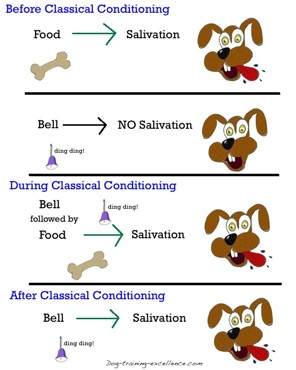
Ivan Pavlov was a scientist that was interested in the physiology of salivation. He developed experiments to understand when and how much a dog would salivate. In this experiment, the dog's had a cannula to collect the saliva, and were given different amounts of food.
During his experiments Pavlov discovered that his dog's learned to salivate not only when food was placed in his mouth, but also when they heard the lab tech approaching with the food along the hallway. Intrigued, he developed more experiments to understand what was going on.
In his classic experiment, he would sound a metronome right before feeding the dog. After many repetitions, the dog would start salivating at the sound of the metronome, but before food was given to him. The dog had learned to associate that the metronome -predicted- food was coming (and his body starting getting ready to receive the food, hence the salivation). He developed his theory to explain how how we can make associations of stimuli from the environment and its consequences.
Advanced books to learn about classical and operant conditioning
If you think this subject is fascinating, this is just the tip of the iceberg! There is so much to learn about behavior and how animals learn and it's all powerful knowledge. The following books are more advanced but will blow your mind!
Learning and Behavior
by Paul ChanceThis is a college text book. However, Paul Chance writes and explains things SO WELL that you won't realize you are actually reading a text book. If you want to understand and learn about the psychology of learning and behavior, this is a must have! |
The Science of Consequences
by Susan M. SchneiderThis book is written to educate lay readers, you don't need a degree in psychology to follow this book. The book links what you just learned with neurophysiology, genetics, society and more. If you are a bookworm and nerd like me, you will love it too! |
Frequently asked questions about operant conditioning
Does operant conditioning work in humans?
Does operant conditioning work in humans?
YES! It works on all animals, including humans. From a small ant to a big elephant, from a lazy panda bear to a ferocious crocodile. You can use it to change the behavior in your mother-in-law, adolescent child, spouse, teacher, student, boss, employee, etc. BONUS: Using positive reinforcement to change the behavior of those around you will change everyone's life for the best!
What is the difference between instrumental conditioning and operant conditioning?
What is the difference between instrumental conditioning and operant conditioning?
No difference, they are synonyms. They are two ways to call the same learning principles.
Is operant conditioning a good thing?
Is operant conditioning a good thing?
If used correctly and with a focus on positive reinforcement, yes. It's a very good thing. However, when misused, it can create a lot of harm. NOTE: You use, and are affected by, operant conditioning 24 hours a day, 7 days a week with everyone and everything you interact with (including electronic devices). The key is to understand how it works to make life easier for you and those around you.
Can operant conditioning be negative?
Can operant conditioning be negative?
It can be negative as in "bad" when there is too much emphasis on punishment or when misused (basically when someone has no clue of what they are doing). Operant conditioning happens to you and from you all day long, if you understand how to use it well, your life will be enhanced. If you don't understand how to use it, you may be doing a lot of harm to yourself and to others. Addiction to electronic devices is a good example.
What is operant counter conditioning in dog training?
What is operant counter conditioning in dog training?
The same principles of operant conditioning apply. The difference is that there is a pre-existing behavior that we want to change. In this case, because there is a pre-existing behavior we sometimes call ir "counter-conditioning".
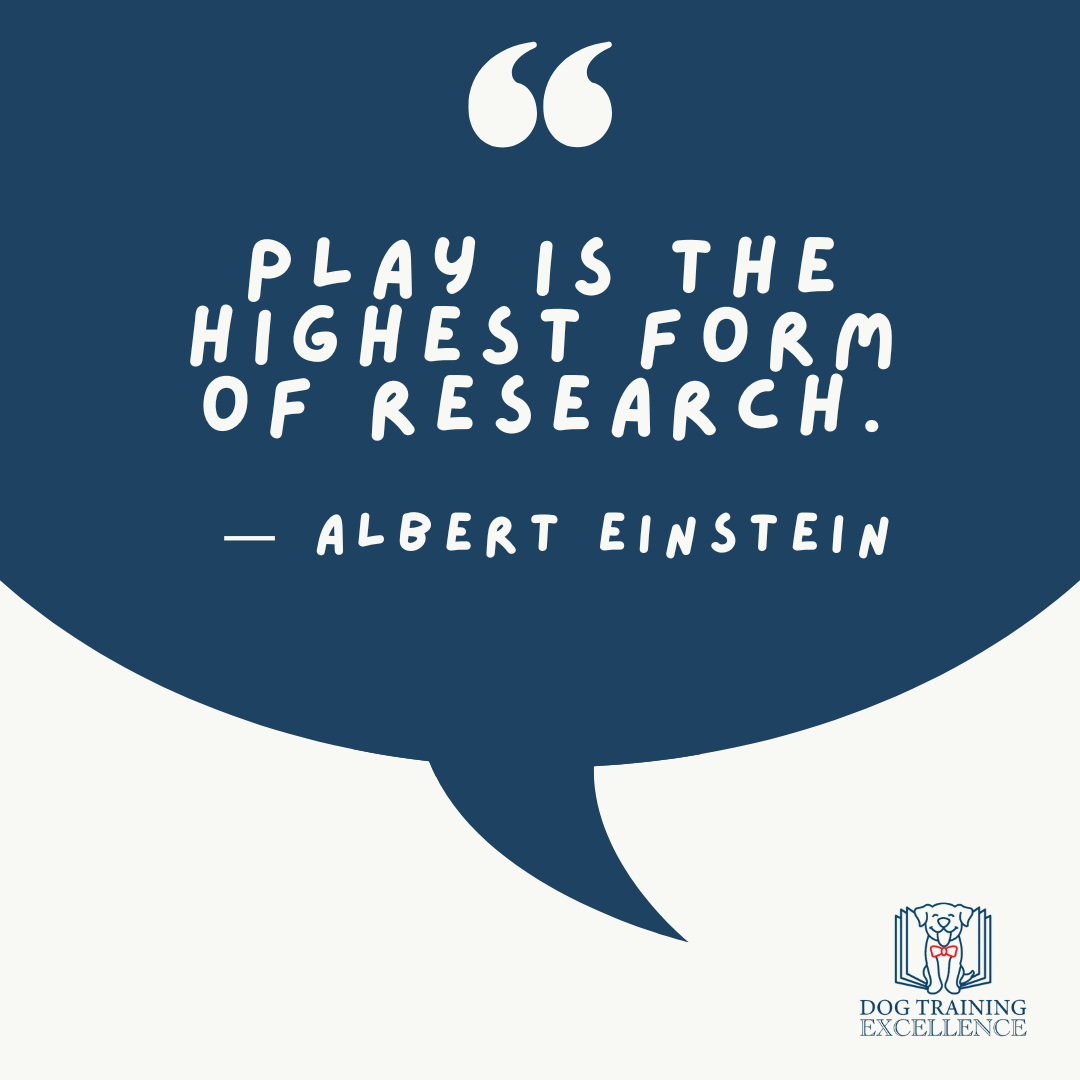
This article was written by Natalia Rozas, Ph.D. and Certified Professional Dog Trainer (CPDT-KA #4071465) and updated on March 29th, 2024. The case studies and anecdotes are real but to protect the privacy of our clients the names and details are changed.
- Home
- Training Methods
- Operant Conditioning

